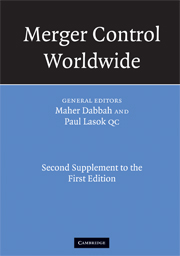Book contents
- Frontmatter
- Contents
- List of contributors
- Table of cases
- Table of legislation
- Introduction to the Second Supplement
- Introduction to the First Supplement
- 1 Argentina
- 2 Armenia
- 3 Australia
- 4 Austria
- 5 Belgium
- 6 Brazil
- 7 Canada
- 8 Chile
- 9 China
- 10 Denmark
- 11 European Union
- 12 Germany
- 13 Greece
- 14 Iceland
- 15 Italy
- 16 Japan
- 17 Republic of Korea
- 18 Malta
- 19 Mexico
- 20 The Netherlands
- 21 New Zealand
- 22 Norway
- 23 Singapore
- 24 Spain
- 25 Switzerland
- 26 Taiwan
- 27 Ukraine
- 28 United Kingdom
- 29 United States of America
- Index
16 - Japan
Published online by Cambridge University Press: 30 July 2009
- Frontmatter
- Contents
- List of contributors
- Table of cases
- Table of legislation
- Introduction to the Second Supplement
- Introduction to the First Supplement
- 1 Argentina
- 2 Armenia
- 3 Australia
- 4 Austria
- 5 Belgium
- 6 Brazil
- 7 Canada
- 8 Chile
- 9 China
- 10 Denmark
- 11 European Union
- 12 Germany
- 13 Greece
- 14 Iceland
- 15 Italy
- 16 Japan
- 17 Republic of Korea
- 18 Malta
- 19 Mexico
- 20 The Netherlands
- 21 New Zealand
- 22 Norway
- 23 Singapore
- 24 Spain
- 25 Switzerland
- 26 Taiwan
- 27 Ukraine
- 28 United Kingdom
- 29 United States of America
- Index
Summary
The amendment to the Antimonopoly Law of Japan, which has a material impact on enforcement practices under the Antimonopoly Law by the sole competition enforcement agency, the Fair Trade Commission of Japan (the “JFTC”), has become effective as of 4 January 2006 (the “2006 Amendment”). However, that Amendment has not introduced a legislative change in relation to merger controls. Rather, the changes concerning merger control were made through an amendment to the former merger guidelines published by the JFTC and the prior consultation system in which companies involved in a concentration may obtain a clearance by the JFTC in advance.
While the JFTCs is considering amending the Antimonopoly Law with regard to the filing requirements for the specific concentrations in the near future, no detailed information on such thinking is available to date; nor has the JFTC taken any concrete steps in this regard.
This supplement aims to provide Merger Control Worldwide readers with an overview of the merger guidelines and the prior consultation system as recently amended by the JFTC.
Regulation under the Antimonopoly Law and prior consultation
Concentrations which may substantially restrain competition in a particular field of trade (i.e., the relevant market) or which involve unfair trade practice will be prohibited under the Antimonopoly Law. Companies, whether domestic or foreign, involved in such concentrations are subject to the merger regulation mechanism of the Antimonopoly Law.
- Type
- Chapter
- Information
- Merger Control WorldwideSecond Supplement to the First Edition, pp. 73 - 77Publisher: Cambridge University PressPrint publication year: 2008

